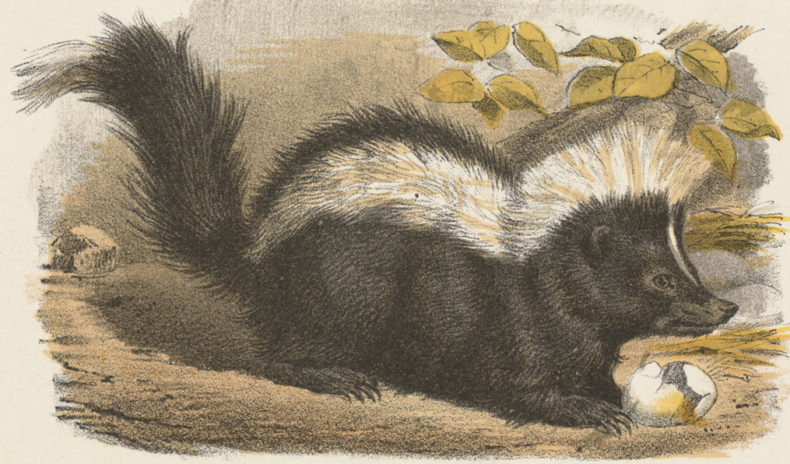
It was such a nice night. September in the low mountains is lovely — hot by mid-afternoon, cool enough for a sweater by sundown — and it’s the best time of year to sit outside after dinner. We were enjoying the peace of the late-summer forest. And then the skunk came.
The dog was in the woods, as usual, and we were hearing mild rustling sounds, as usual. Nothing big enough to be a bear, so I assumed it was a bunny. And then we heard Sunshine run.
I called her name, but she just shook her collar. I figured whatever she’d just chased off was keeping her attention, but I was a little worried it was a bear, or worse, a cub. We stood up and called her more forcefully and she came this time, panting and stinking, oh my word she was stinking.
I’ve never smelled a skunk in the act of spraying. Of course I’ve smelled the aftermath of a spritz, sometimes driving through skunk essence on a road at night or even while walking in my neighborhood. (This skunk is a resident.) But smelling fresh spray before the oils are dry, inhaling it within 45 seconds of my dog getting a faceful, was different. More ripe. More acrid. An abominable fume, eau de toilette at a National Forest Service campground, redolent of smoldering hatred, a malodorous tang of almost indescribable terribility. I had to know more.
A skunk’s spray spews forth from its anal glands, which are organs dogs have as well and that I wish I didn’t know existed. The secretion itself is composed of thiols and thioacetates, organic compounds that contain sulfur. The smell of Hades. The skunk that sprayed Sunshine was probably a common striped skunk, judging from my trailcam footage. Its Latin name is Mephitis mephitis, after Mefitis, a pre-Roman goddess of the center of the Earth and its associated hellish smells. I thought immediately of Mephistopheles. Solamen miseris socios habuisse doloris.* At least my dog’s misery was shared by her parents?
I also learned that you must not get your dog wet after she’s sprayed — oil and water don’t mix — but instead first neutralize the oil using dish soap and hydrogen peroxide. I tried to imagine my dog as a baby duck suffering from an oil spill.
The smell was otherworldly. I tried to put it into words. None of them was quite right, but this list was a start.
What Skunk Spray Smells Like
- Nuclear waste ashes
- A bear suffering from dysentery
- Rancid diapers
- Expired turkey eggs moldering next to a July-ripened watermelon, but it’s September
- Rancid diapers doused in pickle juice, then lit on fire
- Meat from the unplugged refrigerator in this house down the mountain from me
- Stinky stinky bad fish
- Rancid diapers doused in pickle juice, lit on fire, and extinguished using the Churchill Court house’s rotting meat
- Hades
- A corpse flower
- A toddler’s sippy cup filled with milk and forgotten in a diaper bag for three days, then sprinkled with Tajin, then ignited in the same fire ring as the diapers and scary-house meat
- Methane exhaust from a landfill experiencing a heat wave
- Expired Costco-sized wheel of brimstone
- The Humane Society’s front entrance (just kidding, Sunshine)
Bonus:
The Parts of Speech Most Useful in Conveying the Experience of Your Dog Being Skunked
Verbs
Sniff
Smell
Go (as in “go potty”)
Rustle
Run
Nouns
Dog
Rock
Woods
Night
Meadow
Skunk
Boundary
Stink
Interjections
My second grader is learning about interjections in school, and added, helpfully, the following:
Ahh!
Eek!
Whoa!
Eww!
Oh s-word!
Indeed.
*I apologize to the ghost of Christopher Marlowe for linking this phrase to Urban Dictionary
Image:
L. Prang & Co., 1861-1897, Boston Public Library Chromolithographs, via Wikimedia Commons. CC-BY-2.0
I love this piece–mostly for the beautiful writing, but also because I was physiologically unable to smell skunk for most of my life. When those around me could smell it easily, I would sniff deeply and…nothing. I evidently had a specific anosmia for that odor, and it was intensely frustrating to me that nobody could describe it in a way that made sense to me. And then, a couple of years ago, I was walking with family down a road in rural Pennsylvania, and I smelled something weird. At that moment, my stepson called out “skunk!” I’ve smelled it several times since, twice while driving past a roadkilled skunks, so that assured me I wasn’t imagining it. I spoke with someone who studies the neuroscience of smell at Princeton, and he confirmed that this was perfectly possible. Amazing!
Becky certainly is a beautiful writer, Mike. And now that you can smell skunks, are you happier? or would you prefer anosmia?
Great piece Becky. For anyone who needs it, here’s a receipt for how to de-skunk your dog. It really does work! (I can say from experience.) https://www.lastwordonnothing.com/2015/07/27/stupid-shit-my-dog-has-done-part-2-how-to-de-skunk-a-dog/
Rebecca, I love this! I’m not sure why–but I always find essays about the stinky, subjectively gross elements of animal life refreshing. Maybe my life needs a bit more wild in it. Although when I was running in the woods a few days ago, something soft brushed against my leg. I looked down and expected to see a squirrel or a rabbit, but it was a frog who met my leg mid-leap! So grateful I spied it on its way. And even more grateful that it wasn’t a skunk.
I’m happier! At last, I know what people are talking about. (I’ve long had the same problem when people describe venison as tasting “gamy,” which is 100 percent meaningless unless you already know what that taste is like. But when I was finally served it in Norway, it tasted like…beef. So that’s still a mystery). And I don’t find the smell to be awful, but that m.
…might be because I haven’t had a concentrated whiff of it.